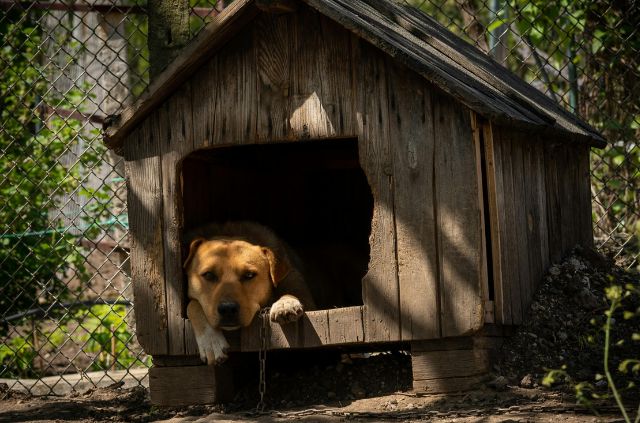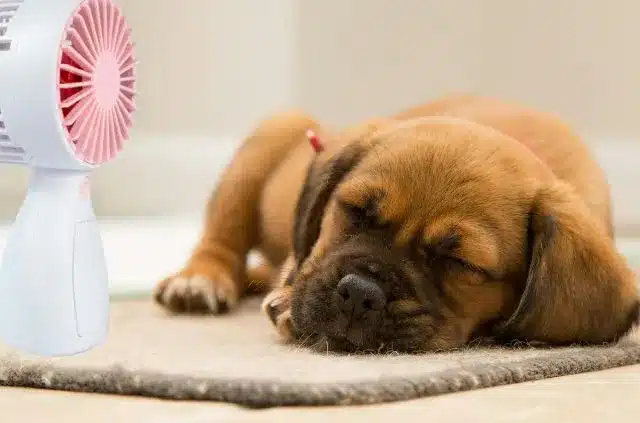Have you ever wondered why your dog sleeps under your bed? Changes in dog behavior can sometimes be a mystery, especially when you’re not used to it and can’t find your dog when you wake up. You might even suspect that this new habit is due to anxiety or stress.
Don’t worry — sleeping under the bed isn’t unusual for dogs. In fact, dogs are known for quirky habits, and this particular behavior has a scientific explanation. The space beneath the bed offers a small, confined area that feels dark, private, and safe to them — an ideal spot for comfort. While each dog may have their own reasons for seeking out this space, understanding these behaviors can help strengthen the bond between you and your pet.
Why Does My Dog Sleep Under My Bed – 22 Reasons!
In this article, we will find several reasons to justify why your dog starts sleeping under the bed. Some of these reasons may be more concerning than others but knowledge of these fascinating reasons will enable you to create a much more comfortable living area for your dear little pet. Let’s have a look at them:
1. Your Dog Has Unique Sleeping Habits

Dogs are known for their peculiar sleep patterns because they reinforce their denning instinct and comfort-related napping. They normally prefer a cozy enclosure, minimum stimuli, and familiarity. That is why they sleep differently, making it an even more intense bonding with comfort.
Some general sleep patterns of a dog include its tendency to seek enclosed spaces and silent areas. You will have to look for professional advice from a veterinarian or an animal behaviorist if you are concerned about the unique sleeping pattern of your dog.
2. Your Dog has Reduced Eye Contact

It’s often a subtle indicator that a dog is experiencing anxiety, stress, or feels overwhelmed – perhaps even scared. It leads them to sleep under a bed. The act of hiding minimizes social interactions and reduces the amount of eye contact, thus decreasing the dog’s emotional state in stressful situations. Here, security calms down their nerves in such a confined space. The possible causes for avoidance of eye contact and sleeping under the bed include anxiety or fear, sensory overload, social anxiety, past trauma, and medical issues.
Observe your dog: is it a pattern or other indicators of anxiety? You can consult with a veterinarian, animal behaviorist, or dog trainer on how these might be a potential cause for under-bed sleeping. They will be able to identify what causes this and may even collaborate with a plan that helps improve your pet’s comfort and well-being.
3. Your Dog Is Going Through Anxiety, Sickness, or Pain

Dogs also seek comfort by hiding or sleeping under the bed when they are anxious, sick, or in pain. The space under the bed is a protected, dark, and enclosed area where your dog feels safe. They instantly need a den-like space when they are feeling unwell and insecure from potential threats or perceived dangers.
4. Your Dog Is Not Feeling Well

If your dog is trying to sleep under your bed then there is a possibility that it is seeking solitude. Dogs may hide when the surroundings are unfamiliar to them. Probably, your dog hiding or sleeping under the bed to avoid interaction with the other family members or other pets in the house because they need to protect themselves from the potential harm.
This can be because it is not in the mood for cuddling and playing with your other pets. There is also the possibility that the dog is not feeling well because of stomach issues, joint pain, or neck pain.
5. Your Dog Is Afraid of Something

Fear is another reason for heading under the bed to sleep. Your dog could be hiding under the bed because he has heard a scary sound like thunder or rumble.
Also, dogs have abilities to react to sounds that are inaudible to us. Therefore, the dogs may seek refuge under the bed for a quieter and hiding place.
6. Your Dog Is Looking For a Den

Dogs enjoy sleeping in cave-like places that somewhat resemble a den. Maybe your dog has recently discovered how cozy and comfortable this area is under the bed and doesn’t want to be bothered by any other areas in the house where there is more traffic. Look for signs that your dog is happy when it is sleeping under your bed because then it can be a regular, normal behavior.
Dogs seek these private, dark, and cozy areas because they feel more protected, safe, and secure there.
7. Your Dog Wants Company

If you do not allow the dog to sleep on the bed, it may choose to sleep in a place near you. By sleeping under the bed, your dog can keep tabs on you. He may find comfort under the bed because it has your scent.
Your scent and fragrance provide a sense of familiarity and reassurance to the dogs. It may also prove as a calming effect for your dog.
Read Also:- 5 Ways Pets Are Improving Their Owners’ Lives
8. Your Dog Needs a Break

Your dog gets easily overwhelmed by too much activity and may be required a break at times especially when they are getting older. There could be several reasons for that like you may have your friends or kids over or other puppies and pets.
Your dog may be hoping for some personal space for hiding and ends up sleeping under your bed. Dogs appreciate quiet and solitude and by hiding under the bed they can retreat from noise, commotion, or other disruptions happening at the house.
9. Your Dog Is Resource Guarding

If you find that your dog is sleeping under the bed with a bone, toy, or anything he found on the floor, he may be engaged in resource-guarding behavior. Dogs like to guard the things that they find most valuable and attractive.
In this condition, your dog may growl, stiffen, or even bite when you try to approach them while they are having something in their possession.
Some of the dogs may also guard the places they like or find interesting. It is better to stay away from the dog when they are resource-guarding because it may lead to a bite.
10. Your Dog Is Hot or Cold

The place under your bed may offer a cooler or warmer environment depending on the season and the temperature of your home.
Naturally, dogs want the areas that will provide the most comfortable temperatures. Your dog may be sleeping under the bed to find relief from the heat or during the winters there may be a rug or carpet under the bed that can provide extra warmth to your dog.
11. Changes in Appetite and Sleep Patterns

Dogs may also start sleeping under the beds because they are changing their appetite and sleep patterns like decreased appetite, loss of interest in food, and disruptions in sleep cycles. The loss of appetite may be due to health conditions like gastrointestinal parasites or congenital problems that may decrease the appetite or prevent them from eating large amounts of food.
12. Your Dog has developed a habit

The dog’s habit of sleeping under the bed develops as a result of an acquired preference. When a dog experiences the comfort and security under the bed, the seclusion becomes a safe harbor in which the dog may retreat.
This trend is evident in dogs whose experiences within the under-bed environment have been positive by being in a quiet place or escaping from the noise of people walking about the house.
A familiar environment full of regularities is ideal, prompting the dog to keep going back. This habit formation highlights the importance of the environment in shaping the dog’s preferences and behavior.
13. Your Dog is Aging and needs less Interaction

Most dogs’ excitement and social demands decrease with age. The household pet becomes more of a loner as it gets older, preferring to rest its head in less visible places, including under the bed. It can sleep soundly and avoid all other beings thanks to the area beneath the bed.
The area offers older dogs a warm and thankfully quiet haven where they may relax without being overwhelmed by activity and disturbances on a physical or mental level.
14. Your Dog is Pregnant

During dog pregnancy and nesting periods, female dogs frequently search for enclosed, ample spaces to feel comfortable and secure. The bed’s underside also functions as an excellent singular retreat.
This naturally driven behavior ensures the brood dog has a hushed, safeguarded section to calm down and get ready for her puppies’ appearance. It helps guarantee your pet’s physical and emotional health during critical periods.
15. Your Dog Needs Privacy and Safety

Dogs enjoy the sense of privacy and protection that the space under the bed gives them. This place serves as their refuge, a place where they may relax. Under the bed is a haven for most dogs, notably timid ones, where they can flee when they start to feel unwell.
The basic principle that dogs, as den animals in the wild, prefer a quiet and cozy space is the basis for the need for a safe and secure space.
16. Your Dog Wants to Avoid House Guests

Are you still wondering why does my dog sleeps under my bed? It can be because it wants to avoid house guests. Likely not a fan of strangers if your dog bolts under the bed when visitors arrive. Dogs that live in the house can become distressed by new faces, loud noises, and increased movement. Their haven becomes under the bed, which provides a space away from the chaos. Their man cave is a spot to chill out when things get too hectic.
A study conducted by the American Kennel Club states that out of 40 percent of dogs are anxious when they meet new people. Shy or anxious dogs, in particular, desire a place of retreat to avoid the hustle and bustle. Therefore, when guests rush in, the dogs run up for comfort and warmth under their bed.
17. Your Dog is Following Its Pack Instincts

Dogs are pack animals and their wild ancestors all slept together in a den. Your dog wants to sleep under the bed due to instinctual denning behavior. In the wild, a den is an enclosed area that is secure and provides a place for animals to rest safely, away from predators.
So, if your dog feels safe but doesn’t have a more suitable location, they might just head under your bed to snooze! It is an inbuilt behavior, like how we want to sleep in our beds. It carries out this behavior to get that feeling of being snug as a bug and being part of its pack. Even that pack is your family. That space under your bed is their version of a modern-day den that makes them feel safe and secure at home. German shepherd dogs can also follow their pack instincts but that depends upon their types.
Also Read: How to Train a German Shepherd
18. Your dog likes the texture of your carpet

We all like soft and cozy surfaces to sleep on, right? Then why not dogs? If you have a soft and furry carpet, your dog probably enjoys sleeping under the bed because it finds the rug irresistible. When it has just been freshly steamed, the carpet’s warm and soft texture makes it a cozy spot, especially during those chilly winter nights. The combination of warmth and comfort provides the perfect environment for your dog to snuggle up and have a restful sleep.
19. Your dog is being naughty

Sometimes, your dog can do anything against the rules, and they will feel guilty about that. It’s unclear whether dogs feel “guilt,” as we understand it, but they can learn which behaviors get them into trouble. If your dog realizes they’ve broken a rule, they might be hiding under the bed to avoid getting caught. They know they’ve done something wrong and are trying to stay out of sight to avoid a telling-off.
20. Your Dog is Looking for a Cooler or Quieter Space

Dogs often exhibit interesting behaviors. Some common behaviors include seeking cooler or quieter places. Knowing these makes people create good environments for their pets. For instance, dogs often seek cooler or quieter places under the bed for temperature regulation and noise sensitivity when uncomfortable with warm or overly stimulating environments. Moreover, the space under the bed mostly will be cooler and has minimum direct heat from solar rays or other household activities.
Further, if a dog fears loud noises—thunderstorms, parties, fireworks, or construction—they find the solitude of being under the bed comforting and isolating them from stimuli that cause them stress. This is an instinctual behavior considering that den animals, for the most part, will seek out enclosed spaces as comfort areas and sources of protection from danger. Therefore, withdrawing into these quieter environments can lower the stress among dogs and make them feel safer in their environment.
21. Your Dog is Suffering through Separation Anxiety

Separation anxiety compels dogs to sleep under their owner’s bed in search of comfort and reassurance from the distressing emotions of being left alone. Other such behaviors include destructive behavior, excessive barking, pacing, and clinginess due to phobias like abandonment, insecurity, over-attachment, previous trauma, and also breed characteristics. Separation can be attempted gradually along with other comfort objects which are known to him. The dog will also need to engage in some form of exercise, mental stimulation, and desensitizing on departures.
22. Your Dog is Bored

If your dog has been sleeping underneath your bed then the dog may have been bored. If the dog does not engage in exercises or physical activities, then he will be drowsy. The top causes of boredom that result from sleeping under beds are lack of enough physical activities, not being mentally stimulated, too much routine, and lack of socialization. Common indicators of boredom are sleeping more than usual, restlessness, destructive behavior, whining, and loss of interest in activities. These can be addressed through increased exercise, mental stimulation through puzzle toys or training, rotation of toys, variation in daily routines, and socialization of your dog through playdates or dog park visits.
Conclusion
Sleeping under the bed is typically not risky for dogs and it provides them with a sense of security and comfort. The dogs usually make use of the space under the bed to enter and exit comfortably. It is rare when a dog gets stuck under the bed. If you are worried about this behavior, keep an eye on your dog and monitor for any signs of discomfort and anxiety.



